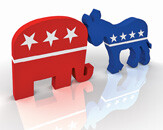
United Methodists thrive in between varying shades of gray
Within the Baltimore-Washington Conference, sitting at the same table are United Methodists who believe in creationism, denying the scientific theory of evolution, and United Methodists who think the first story in Genesis was written by two different people, in two different centuries, and joined together to provide a record of the Hebrew creation myth.
These are people who see the Bible as the "inviolate and sacred Word of God," and those who "take the Bible too seriously to take it literally."
At this same table are United Methodists who share differing views on the possession of handguns, the use of video in worship services, the death penalty, how often to serve Communion, the ordination of homosexuals, whether prayers of confession are necessary at every worship service, who to vote for in the upcoming presidential election, and when Jesus just might come again.
But one of the most interesting differences is how United Methodists feel about miracles.
In an age of science and reason, it may seem surprising that so many people seem to take miracles to heart. But a casual poll of United Methodists suggests that people not only believe in miracles, most seem to count on them.
Some claim to see "every moment of light and dark as a miracle." Others ascribe to the sentiment that "where there is great love, miracles abound." While still others believe, but are hesitant to demand "acts of two plus two equals five," believing that God unfolds miracles in God's own time and space.
This "generous orthodoxy," was apparent in the second part of a major survey by the Pew Forum on Religion and Public Life, which was released this summer.
The first part of the comprehensive survey, which included interviews with more than 35,000 Americans, found that in the United States, religion is "a vibrant marketplace where individuals pick and choose religions that meet their needs."
The second part of the survey moved beyond demographics and found Americans seem to have a tolerance for differing opinions and are less dogmatic than some people believe.
A strong majority of believers, which includes 89 percent of Mainline Protestants, say they do not believe their religion is the only way to salvation. An almost equal number, which includes 82 percent of Mainline Protestants, believes there is more than one true way to interpret the teachings of their religion.
This doesn't mean, the survey stressed, that Americans don't take their religion seriously. The U.S. Religious Landscape Survey also showed that more than half of Americans say religion is very important in their lives, attend religious services regularly and pray daily.
Nearly eight-in-10 Americans (79 percent ) agree that miracles still occur today as in ancient times and 68 percent believe that angels and demons are active in the world.
However, not all of the 73 percent members of the Mainline Protestant church who are absolutely sure that God exists (which might strike one as a frighteningly low amount of certainty), approach God in the same way.
According to the survey, 34 percent of Mainline Protestants attend church at least once a week. (Another frighteningly low figure.)
Half of all Mainline Protestants (53 percent) say they pray daily. One-third of Americans receive definite and specific answers from God at least once a month. About a third of Americans also say they share their faith with others at least once a month.
Nearly half (47 percent) say they seldom or never share their faith or view on God with people from other religious backgrounds. This response has either half-empty, or half-full consequences when one thinks of evangelism.
But I was interested when 44 percent of those affiliated with a particular faith said their religion should preserve its traditional beliefs and practices; roughly one-third said their religion should adjust to new circumstances and only one-eighth (12 percent) said their religion should not adapt to modern beliefs and practices.
That, I think, might be a further reflection of the generous orthodoxy with which people approach their faith. Their faith can not be compromised, but neither can it be narrow.
One thinks immediately, of course, of St. Augustine's quote: "In essentials, unity; in non-essentials, liberty; in all things, charity," and of John Wesley's sermon on Catholic Spirit: "If your heart is as my heart then give me your hand."
Neither disavows God's commands or his love.
But this generous orthodoxy, bubbling up in our culture and reflected in the Pew survey, does draw the circle wider and invites more and different people to the table. This in itself is part of continuing to create God's Kingdom. And it is good.
 |
| United Methodists on the issues: According to the U.S. Religious Landscape survey:
|

Login/Register to leave comment